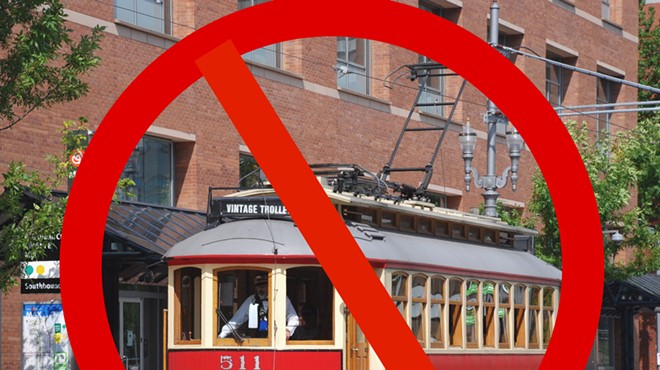Thursday, April 14, 2016
Stuckart hits back at error-ridden Washington Policy Center transit column

Speed
Sadly, STA's alternatives analysis rejected the "Bus That Can't Drop Below 50 Miles An Hour Without Exploding" option as requiring too much upkeep to be practical long-term.
On Monday, the Spokane City Council voted to change the language in its Transportation Benefit District to allow funding to be used for transit projects, not
Chris Cargill with the Washington Policy Center, however, was not such a fan of the choice . He wrote a blog post titled "Stealing from the streets fund for Spokane’s electric trolley?" accusing city council members of wanting "to raid a dedicated public roads account and spend the money on an unpopular transit project that voters have rejected.”
The council, however, has repeatedly pointed out that a majority of their voters — the ones in the city — actually voted for the large transit project last April that included the Central City Line, a high-frequency electric bus route that would stretch from Browne's Addition to Spokane Community College.
And council members have repeatedly said they do not plan to "raid a dedicated roads account." Though the ordinance does not prevent the city council from someday eventually diverting money from streets to transit, the council has repeatedly said that TBD funding raised for the Central City Line would come from a separate ballot measure.
Wednesday afternoon, Ben Stuckart sent a letter to all of Washington Policy Center's Eastern Washington advisory board members, accusing Cargill of "willfully mischaracteriz[ing]" the council's actions.
"He apparently either
Stuckart also linked to the Inlander's "Not A Trolley" post in his response. Cargill continues to call the Central City Line an "electric trolley" despite the Inlander doing its best to explain that the current design doesn't meet any definition, anywhere, of "trolley."
Two weeks ago, I spoke with Cargill about his insistence on continuing to call it a trolley. Here's my understanding of his argument:
1) The project was originally referred to as a "modern electric trolley" when it was selected.
2) While there were changes to the design before voters voted on it last years, Cargill argues the project still won't meet a common definition of "Bus Rapid Transit," which STA has sometimes referred to it as. (It does meet at least one federal definition.)
3) So Cargill's still calling it a trolley, despite the fact that the high-frequency electric-bus line will not feature a rail or an overhead wire, the features that make trolleys and streetcars trolleys and streetcars.
As an analogy, it's a little like someone changing his mind about ordering pasta, and ordering Chicago-style pizza instead. But since some people don't consider Chicago-style pizza to technically be pizza, the person sitting across from him insists on referring to the deep-dish delicacy as "pasta."
Brandon
“Like other information he’s produced about the Central City Line, it was not accurate. We’ve tried to correct the misinformation he’s produced before, but to no avail. Unfortunately, accuracy doesn’t shape his narrative. We’ll let the Spokane City Council correct his twisting of its action regarding the Transportation Benefit District policy, but we see no point in wading into his commentary on a project he benefits from misconstruing.”
Here's the full letter from Stuckart. Emphasis added:
You serve on an Eastern Washington Advisory Board for an organization, the Washington Policy Center (“WPC”). I am certain that as a board member you have very little editorial control as to what gets printed by the WPC. I am writing to ask that, in the future, your advisory board consider whether publishing completely false information is within the role of a non-profit educational and research organization. I care deeply about my community. I expect strong discussions as to the correct policy actions to address the issues facing it. I expect pushback and opposition to my proposals just like every other elected official. I do not, however, expect to read a policy article from a purportedly legitimate and respected think tank consistently quoted in our local media that willfully ignores publicly available information.
The WPC’s Chris Cargill published an online blog on April 12th called: “Stealing from the street fund for Spokane’s [Electric] Trolley”. The first six lines willfully mischaracterize the Council’s recent actions and the underlying facts:
• “The Spokane City Council wants to raid a dedicated public roads account and spend the money on an unpopular transit project that voters have rejected.” This is not research. This is not education. At best this line is an opinion. At worst, it’s opposition to a potential ballot measure. We have a citizen board that recommends how we utilize the $2.5 million in dedicated funds for residential street projects. There are no plans to change or alter this in any way. Any additional funds generated for transit through the Transportation Benefit District would require a vote of the people.
• “The project, a $72 million electric trolley line in downtown Spokane, has failed to get approval from the Spokane Transit Authority board of directors.” False. The Central City Line is not a trolley. The Spokane Transit Board of Directors has voted multiple times to approve the Moving Forward plan, which includes the Central City Line.
• “Nearly a year ago voters rejected the trolley project.” Again, the Central City Line is not a trolley. I am attaching an article from The Inlander, the local alternative weekly in Spokane, which pokes a little fun at the people and organizations that continually call the Central City Line a trolley.
The citizens of Spokane County rejected a 0.3% sales tax by a little over 500 votes. That tax would have been used to fund transit improvements across the region – including the Central City Line project. The citizens of the City of Spokane voted over 54% in favor of the same measure. A majority of the voters in our City value transit. My Council colleagues and I are simply listening to our voters.
• “Now, Spokane City Councilmembers have voted to raid the Transportation Benefit District (TBD) account for funds – currently made up of car tab fees of $20 per car, per year”. This is not even close to accurate. On Monday, April 11th, we voted to allow the Transportation Benefit District to consider whether to seek funding for, and spend resources, on transit. We did not allocate or reallocate any revenue. We did not alter or change any street projects. The revenue brought in from car tabs and the projects to be paid for by that revenue was not touched. I am attaching the ordinance adopted on April 11th. This ordinance was publicly available to Mr. Cargill prior to his publishing his article. He apparently either failed, or refused, to inform himself prior to publishing his article.
The Spokane City Council has been and remains clear in our desire to expand transit per our citizens’ wishes. Simply, if STA does not ask the regional voters in November for more service, Spokane will ask the voters to pay for a sales tax increase to pay for expanded service. I expect they will once again say ‘Yes’. This has absolutely no impact on residential street funding.
There are many positions outlined in the City of Spokane’s proposal that the Washington Policy Center can take issue with, such as:
• Is our public transportation system effective and efficient?
• Is there an over-subsidization of public transportation in Spokane?
• Is the Central City Line the best option for a high-performance transit network?
These are the debates the Washington Policy Center should be engaging in and we welcome them, as conversations worthy of community discussion, backed with legitimate research and education. Mr. Cargill’s piece simply did not meet that objective.
I hope you will consider, as an advisory board member, whether Mr. Cargill’s article furthers the interest of the Washington Policy Center, its funders, and the citizens they are looking to serve. I think you will agree that it comes up short of the organization’s goals.
Sincerely,
Ben Stuckart
Spokane City Council President
Tags: #NotATrolley , Central City Line , Washington Policy Center , Ben Stuckart. , News , Image


























